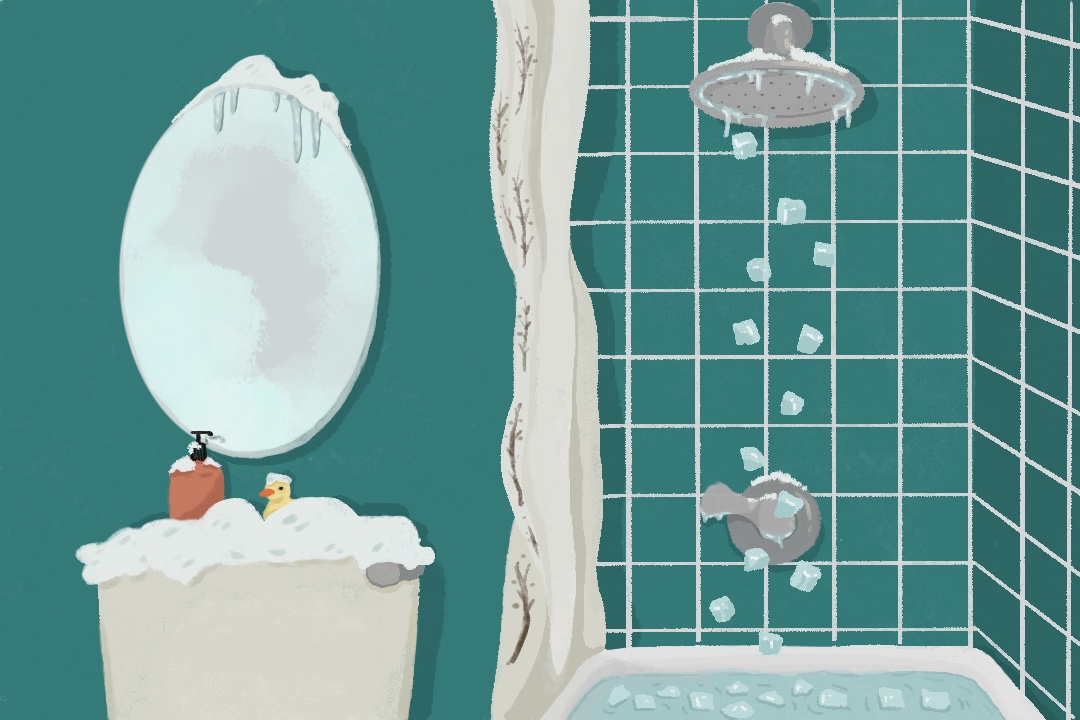Do you remember the time you made a grave error? You stepped inside the shower before you turned the water on. That initial burst — always chillingly cold — hit you hard.
The cringe was unfathomable. The only thing more bone-chilling you can think of is looking at your final grades.
That day a part of you died — the part of you that believes anything is possible, the part that says “Maybe I’ll graduate with a good GPA.” You changed, and now you’ve come to put your hand in first, or simply wait a little before taking a step in and embracing the warm or even steaming-hot shower.
Tales that talk about miracle waters slowing or counteracting the aging process are as old as time. People have always looked for ways to maintain their health: in the past, maybe by trying to bathe in mythical, rejuvenating springs, and these days, by taking time off social media and reading books in candlelit bathtubs with bath bombs.
“Are you talking about a fountain of youth? And what does that have to do with cold showers?” you ask. It would be ridiculous to suggest cold showers restore youth, even though I did feel like a lost child in a blizzard screaming for help when I tried them initially. In fact, you may believe it’s preposterous to even think a cold shower is any good at all, let alone talk about it.
However, I’m here to say cold showers can be your fountain of youth, minus the immortality, and well, minus the looking forward to basking in it. There’s no denying that warm showers are more comfortable, but that doesn’t mean they’re better, at least as far as science is concerned.
Times have changed, and so have our anti-aging strategies, but we’ve come to find out that — besides being vital for the survival of all living organisms on Earth — water is kind of cool, especially when it’s cool.
One cold shower please, decaffeinated
If you’re looking for a substitute for the ever-increasing amounts of coffee you’ve been having every week, look no further. A research article reviewing 16 studies concluded cold water immersion has many effects on the body, including increased heart rate, blood pressure, and respiratory rate. In trials where participants were immersed in it for five minutes or less, cold water — that is, water at a temperature lower than 15 degrees Celsius — was shown to induce a ‘cold shock’ response, activating the sympathetic nervous system and increasing alertness. Whether you’re waking up from a poor night’s sleep, or trying to stay awake after pulling an all-nighter, a cold shower will send a shiver down your spine that would make a wet cat jealous.
If the prospect of no longer being dependent on caffeine is not enough, you may be intrigued to hear that cold showers can boost your immune system as well. A randomized study of more than 3,000 people in the Netherlands sought to find the effects on sickness, quality of life, and work productivity of routinely taking cold showers.
The researchers found that those who regularly took cold showers, even for as little as 30 seconds, were 29 per cent less likely than a control group to call in sick for work. In fact, combined with regular physical activity, their results showed a 54 per cent reduction of absence as a result of sickness compared to individuals who don’t partake in either.
Although there was no reduction in illness days taken, the researchers concluded the cold shower routine “resulted in a statistical reduction of self-reported sickness absence.” Furthermore, while the vast majority of participants reported variable levels of discomfort, 91 per cent reported the desire to continue with their cold shower routine, and 64 per cent actually did, which the authors note as “the most indicative of any health or work benefit.”
Additionally, the researchers found that the most commonly reported benefit was “an increase in perceived energy levels,” including many comparisons to the effect of caffeine. The researchers highlight this study as the first to show that a routine cold shower has a beneficial effect on health.
The cold companion
As painful as they may be, cold showers are believed to potentially boost one’s mood as well. In addition to increasing alertness, the activation of the sympathetic nervous system from a cold shower may increase levels of hormones and neurotransmitters like endorphins and noradrenaline, which relieve pain, help with physiological function, and reduce depressive symptoms. A preliminary study has noted that, because of the high density of cold receptors in the skin, the cold water could result in an “overwhelming amount of electrical impulses” sent to the brain, potentially achieving an “anti-depressive effect.”
Ultimately, a nice, warm shower is admittedly a more pleasant experience. In fact, for the longest time, I only ever showered with steaming hot water. But ever since taking up a cold shower routine recently, even during these colder months, I feel better and it feels totally normal. While a lot more research needs to be done, the positive outcomes — as far as we’ve come to understand — warrant that at the very least, you give it a try. It’s time to quit hot showers, cold turkey.


